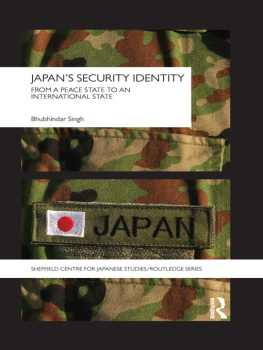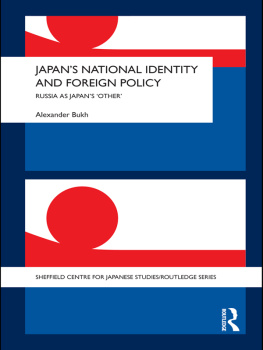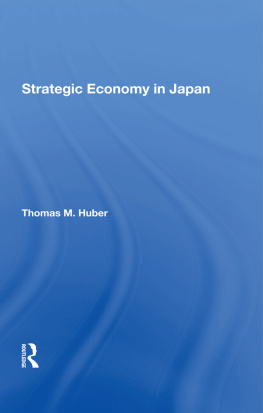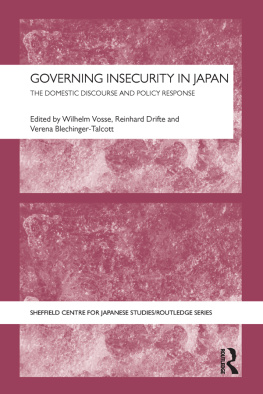Help (Not) Wanted
Help (Not) Wanted
Immigration Politics in Japan
MICHAEL STRAUSZ
Cover image (center): Gabriele Vogt. Image reprinted with permission.
Published by State University of New York Press, Albany
2019 State University of New York
All rights reserved
Printed in the United States of America
No part of this book may be used or reproduced in any manner whatsoever without written permission. No part of this book may be stored in a retrieval system or transmitted in any form or by any means including electronic, electrostatic, magnetic tape, mechanical, photocopying, recording, or otherwise without the prior permission in writing of the publisher.
For information, contact State University of New York Press, Albany, NY
www.sunypress.edu
Library of Congress Cataloging-in-Publication Data
Names: Strausz, Michael, author.
Title: Help (not) wanted : immigration politics in Japan / Michael Strausz.
Description: Albany : State University of New York Press, [2019] | Includes bibliographical references and index.
Identifiers: LCCN 2018040416 | ISBN 9781438475516 (hardcover : alk. paper) | ISBN 9781438475530 (ebook)
Subjects: LCSH: JapanEmigration and immigrationGovernment policy. | JapanEmigration and immigrationSocial aspects. | Foreign workersJapan.
Classification: LCC JV8723 .S87 2019 | DDC 325.52dc23
LC record available at https://lccn.loc.gov/2018040416
10 9 8 7 6 5 4 3 2 1
Contents
Chapter 1
Foreign Laborers, Not Immigrants
Chapter 2
Help Wanted: Immigration Restriction in a World of Labor Shortages, Aging Populations, and Refugee Crises
Chapter 3
Minority Rights and Minority Invisibility: Oldcomer Koreans in Japan
Chapter 4
The Crow Is White: Foreign Labor and the Japanese State
Chapter 5
Asylum as Exception
Chapter 6
Is Another Japan Possible? Public Opinion and Immigration Reformists
Chapter 7
Japanese Immigration in the Age of Trump
Figures and Tables
Figures
Tables
Preface
Today, Japanese people are having no more than two children per couple. If we continue like this, after 200 years there will be no Japanese people. You need not be worried about Japan.
Prime Minister Kakuei Takana, answering a question
about the resurgence of Japanese militarism from
Chinese Premier Zhou Enlai in 1972
(Ishii et al. 2003: 65)
T oward the end of my field research for this book, I interviewed a Diet member (DM) from the Clean Government Party (CGP) who was particularly knowledgeable about economic issues and opposed to immigration. He stated that if firms want to solve labor shortages, they should just raise their wages. I asked him about the limitations of that strategy, given that Japans declining population means that there are too few laborers overall, so even if one sector can solve its labor shortage with domestic labor by raising wages, laborers would have to leave another sector, thus intensifying the labor shortage there. In reply, he observed how Japanese companies in Mexico, for example, have Japanese managers and Mexican workers, and he said that he did not want foreign bosses to manage Japanese workers in Japan. Japan must focus on high-value products, he said. Otherwise Japanese will be hired as cheap laborers (interview 1123).
This answer is telling because it reveals that, even among those extremely well versed in economic issues, immigration is much more than an economic issue; it is an issue of national identity. This DM has a vision of Japanese national identity that is primarily ethnic, and he sees the idea of ethnic Japanese, in Japan, working for foreign managers, as a challenge to something essential about Japans national identity.
The title of this book, Help (Not) Wanted , refers to three different things. First, it refers to the specific problems stemming from shshikreika Japans dual problems of low birthrate and long life expectancy. In short, who will help care for Japans elderly, given the small size of the working-age generation relative to the large size of the retired and retiring generation? This question is more vexing because many people, like the DM whom I referenced above, see immigration as threatening something essential about Japans national identity. Second, the title refers to the common slogan on the windows and doors of businesses that are seeking employees. Japan is currently facing a labor shortage, so these signs are all over the country. Finally, the title is an understated reference to the cries of refugees fleeing oppression all over the world. These are people that need help, in a critical and immediate sense. Most advanced industrialized countries could do more to help refugees, but Japan is particularly unlikely to admit these people and grant them asylum.
The thread tying all three of these senses of the phrase help wanted together is Japans extremely restrictive immigration policy and its very small population of foreign residents. Japans population of foreign residents is among the lowest in the advanced industrialized world, and this is particularly puzzling given its labor shortages, its crisis of shshikreika , and the ways in which its often takes its responsibilities to the rest of the world very seriously. In this book, I explain why Japan has not yet answered the three different voices asking for help by admitting foreign laborers, particularly foreign nurses, or refugees.
Acknowledgments
P arts of are reproduced with permission from Michael Strausz, Japanese Conservatism and the Integration of Foreign Residents, Japanese Journal of Political Science , 11(2) (2010): 24564, Cambridge University Press.
Much of ).
in this book, which began as dissertation chapters, would not have been possible without my outstanding professors at the University of Washington (UW). My first quarter at UW, I took Elizabeth Kiers International Relations Core Seminar. After the first class, I had pizza with several of my classmates, one of whom said that he could sense [Kiers] incredible brainwaves vibrating in the room, a sentiment that immediately made sense to many of us. She was a terrific advisor who read everything that I wrote carefully and quickly. This book would not have been possible without her careful and thoughtful feedback.
The same quarter that I took Beths IR Core, I was a teaching assistant for Steve Hansons large Introduction to Politics class. Steve believes that, in order to lecture a large group of students, you must make very large hand gestures and speak with great enthusiasm. He coupled these dramatic moves with extremely well-conceived and rich lectures on very difficult topics. Although Steve is a Russia specialist, he gave a terrific lecture on Japanese development in that class. He set a high bar for what undergraduate education can be and what it means to be a comparative politics specialist. I often think of him when I create lesson plans and conduct academic research. His feedback was essential in molding this project.
A few years after I arrived at UW, the university made two simultaneous hires that were the best thing that could have happened to my fledgling career as an academic. UW hired Robert and Saadia Pekkanen, two of the smartest specialists on Japanese politics in the United States. Robert and Saadia also proved to be outstanding mentors who gave very insightful readings on dissertation chapters and terrific career advice.










